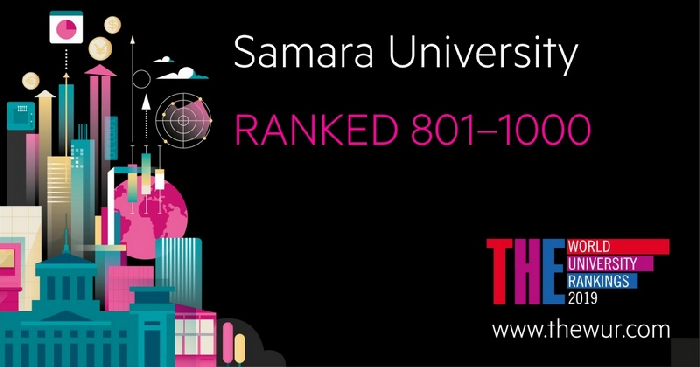According to the British magazine Times Higher Education (THE) 2018 Samara National Research University is counted among the top universities in the world. In the Russian part of the list, the university has reached the 14th position among 35 universities of the country, which have confirmed their competitiveness at the world level.
This is revealed in the global study of THE World University Rankings 2019, released on Wednesday, September 26, which, in total, includes 1,250 best universities in the world from 86 countries.
Russia is represented by 35 universities in the ranking of the best universities in the world. In addition to an extensive group of universities from Moscow and St. Petersburg, universities from only 14 regions of Russia were among the participants. Tomsk, Novosibirsk, Kazan and Perm are represented by 2 universities, Samara, Belgorod, Saratov, Nizhny Novgorod, Rostov-on-Don, Vladivostok, Yekaterinburg, Krasnoyarsk, Volgograd and Voronezh represent one university.
In the global ranking, Samara University is featured in 801–1000 band. Three more Russian universities share this bracket.
"The inclusion of Samara University among the elite universities of the planet testifies the qualitative systemic changes in the structure of scientific and educational activities that have been consistently implemented over recent years, — says Vice-Rector for Educational and Foreign Affairs Vladimir Bogatyrev. — Since 2016, we have been confidently included in the rankings of the best universities in the world according to several authoritative global rankings — THE and QS.
On the one hand, the transformation of the university is aimed to preserve and strengthen our leading scientific schools and research areas, which have received a deserved recognition not only in Russia, but also abroad. On the other hand, it is aimed to consistently introduce the best international standards and practices into the educational process, expand the profile of research activities by attracting leading foreign partners".
The Vice-Rector cited an example of Professor at Florida International University, Alexander Mebel who supervises the work on megagrant “Development of Physically Grounded Combustion Models” within the Russian Federation governmental support for scientific research. International scientific laboratory "Physics and Chemistry of Combustion" was established to implement the megagrant in the university. The project is aimed at solving the burning problem — prevention of environmental pollution. The results obtained in the course of these studies by international scientific teams are published in scientific journals of Q1 level.
"Foreign scientists are attracted by the topics and the level of scientific research which the university is working on, scientific laboratories — they are interested in working here. As a consequence, the publication activity of the university is also growing — for example, the number of joint articles with foreign scientists in foreign publications indexed in the Scopus and Web of Science databases is increasing year by year. The number of citations of works by foreign scientists is also growing", —Vladimir Bogatyrev noted.
Thus, the share of foreign scientific and pedagogical workers has doubled in the past two years. The share of foreign students is growing steadily in the university, for example, the increase was 25% compared to the previous year.
Besides, such criterion as the updating of dissertational councils after the unification of aerospace and classical universities considerably influenced the position of the university— as a result, the quality and number of defences increased significantly.
The university's income from industrial partners (commercial orders under contracts from various enterprises) is also among the research experts' valid criteria. This indicator is also showing positive dynamics year by year.
For reference
The British edition Times Higher Education (THE) is one of the top three ranking agencies in higher education. It annually publishes a global ranking of the best universities in the world. Its methodology is based on 13 performance indicators including teaching (the learning environment), research (volume, income and reputation), citations (research influence), international outlook (staff, students and research), industry income (knowledge transfer).
In 2018 Oxford University occupied the top position of the ranking. M.V. Lomonosov Moscow State University became the leader of the ranking among Russian universities, it occupied position 199.
Samara University is the only university in the region which is among the best universities in the world according to several authoritative global rankings, including the QS World University Rankings (QS), which is annually compiled by the British company Quacquarelli Symonds — in 2018 the university significantly improved its performance in it and moved to the group of universities occupying positions from 701 to 750. And also THE World University Rankings — in 2018 the university is included in the group of universities that share positions from 801 to 1000.


